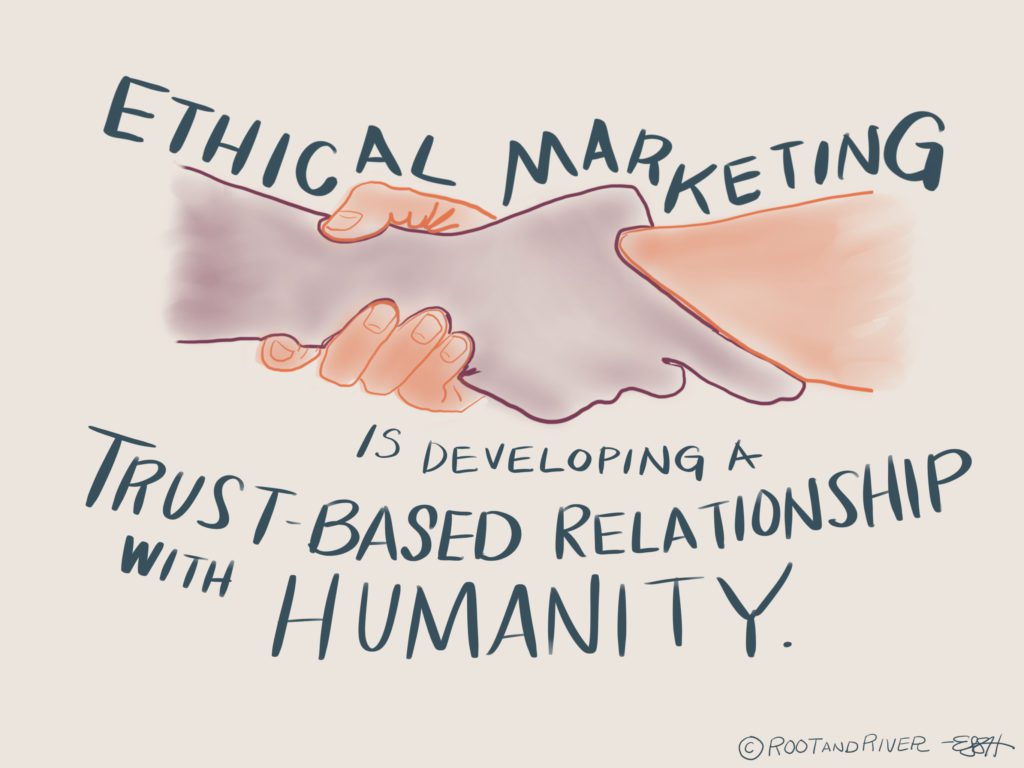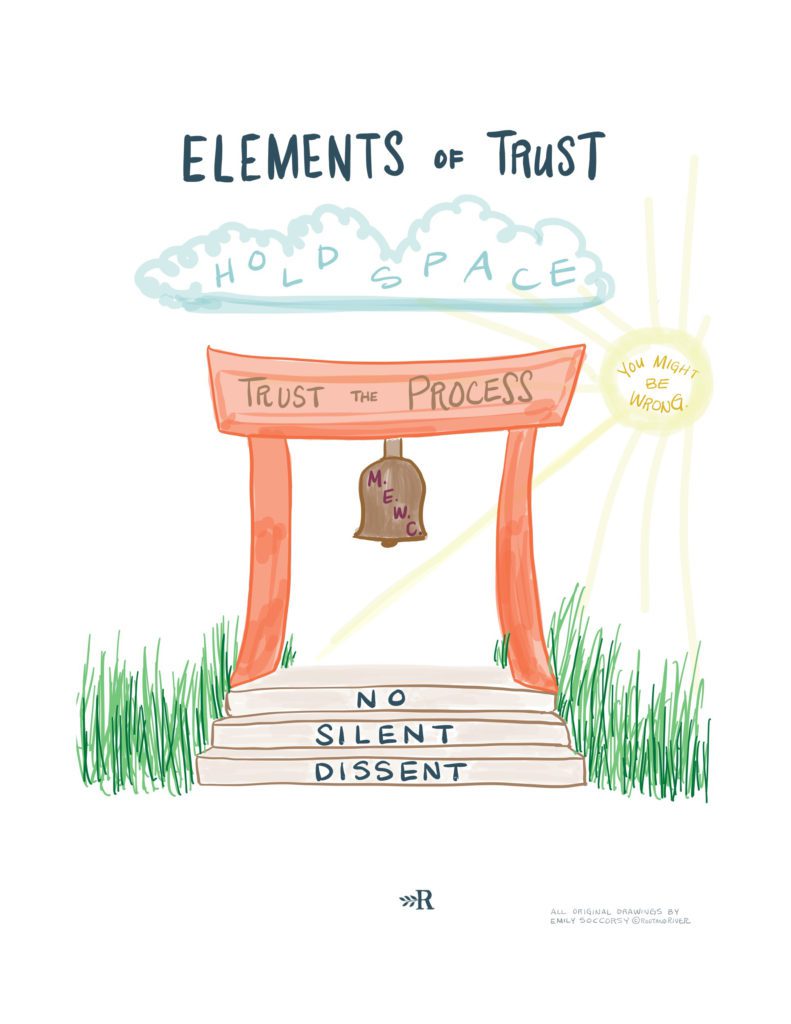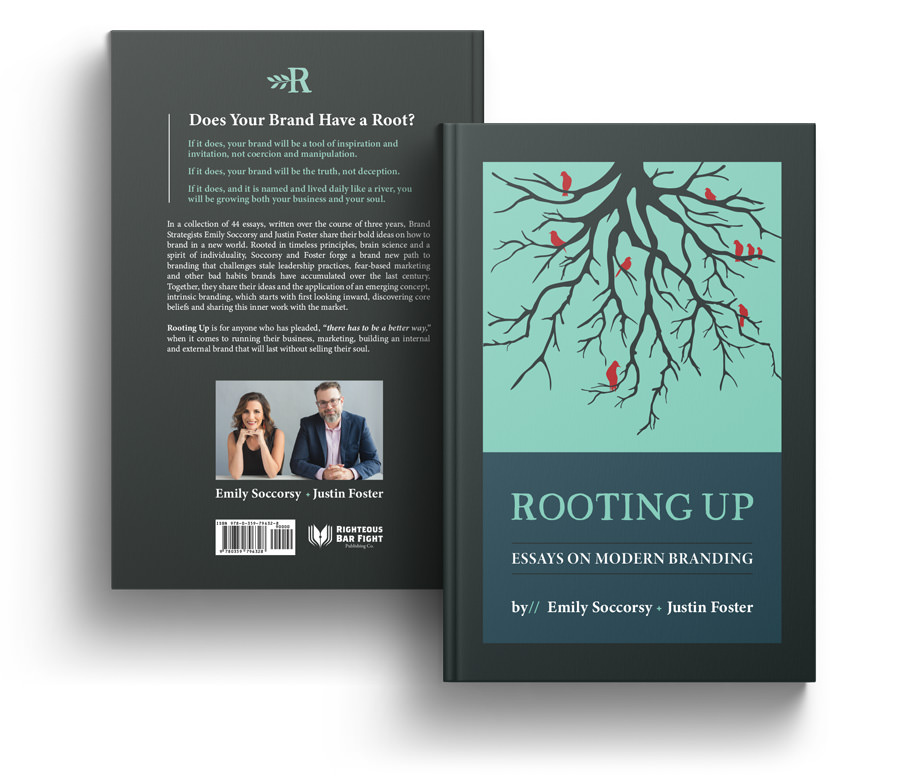Filed Under: Humanistic Marketing
We believe the future of marketing is ethical. And soulful.
That statement may make more than a few people feel itchy.
“Really?” one might ask, “In this saturated, shouting, cutthroat, morass of manipulative information?”
Yes. The way we do it. The way we want to nurture it. The way we envision it becoming.
If you are responsible for marketing for your brand or your business, every day you have a choice to be more ethical and soulful as a person. You also have the choice to select more ethical and soulful approaches. The more often you select these approaches, the more ethical and soulful marketing becomes.
And the more your brand stands apart.
As someone asked us recently, “But does it work?” That answer is also yes. It does. Not with 10 million hits to your website tomorrow. But yes, it does work. Plus, the long term success of your brand will not be because of a short-term gimmick.
It’s possible to market with ethics. Here’s our definition of ethical marketing:
Ethical marketing is developing a trust-based relationship with humanity and with your audience. And like any conscious relationship, this one is based on agreements and practices. We will be sharing insights, ideas and stories on best practices in the coming editions of The Ethical Marketer. As we kick off this monthly missive today, let’s talk about agreements.
We eschew rules. We don’t like following them or imposing them.
However, we love maps and paths with clearly marked trails.
To that end, we developed a set of agreements called The Elements of Trust. Similar to a map, they establish guidelines and boundaries in our work with each and every client we have worked with since we developed them five years ago. The Elements of Trust are designed to facilitate the rapid development of love and trust, of openness and camaraderie. They encourage an environment of respect and excellence.
They serve as gentle and strong reminders of the commitments we make to one another and our audience. The Elements of Trust were influenced greatly by the work of Parker Palmer, particularly in his seminal work, A Hidden Wholeness, and in particular the principles of the Circle of Trust.
Over the years, it dawned on us that the Elements of Trust are also powerful guides for how to market. They are centering forces. They help shape and inform the mindset of ethical marketing, providing a framework for implementation.
- Hold Space – All great work requires an occasional pause to rest, reflect, ruminate. Such is the case with becoming a brand. We’ve observed that one of the reasons marketers sometimes resort to unethical practices is because of a deeply embedded survival response that comes from being afraid, fatigued and overwhelmed. Empty cupboards lead to desperate measures. Further, to practice strategic intuition requires you to tune in and listen to your own soul. It’s hard to be busy and present at the same time. The key is to slow down to brand so you can speed up to execute. In practice, this means structured time to bring fresh eyes to your brand’s language, visuals and experience. It means doing more listening than promoting. It means reflecting on what feels right, not just what feels expedient.
- Trust the Process – There will be moments in your marketing work when you wonder where you are going, how long it is going to take for people to respond. You will question how storytelling and baring the soul of the company or your brand will lead to more business. We understand. That’s OK. And it is part of the process. Branding and its execution arm, marketing, is a creative, non-linear process. Even the greats of our industry knew this. John Wanamaker, one of the most successful early America merchants considered to be a pioneer of advertising said, “Half the money I spend on advertising is wasted; the trouble is I don’t know which half.” If you remain true to the practice of ethical and soulful marketing, one serving as a counterbalance to the other, you will make the process move. You must also make room to trust your own process. That means tuning into your instincts, having a contemplative practice, working in collaboration with others who support you. Always remembering, that at the soul level, the audience is just like you, a human being.
- Have a Beginner’s Mind – “In the beginner’s mind there are many possibilities, but in the expert’s mind there are few.” – Shunryu Suzuki, from “Zen Mind, Beginner’s Mind”. There are plenty of “expert” marketers, but there are precious few ethical ones. By no means are we anti-expertise! It’s just that almost all of the good stuff in creating trust comes from being humble and open to learning. As you venture forth with your ethical marketing practices, please remember to check what you know, as much as possible. If not, it is likely to interfere with your shared discovery with your audience. The application of both curiosity and critical thinking will make you a better marketer. You will continue to evolve and your skill for tuning in to the deeper needs of your audience will grow.
- No Silent Dissent – In the language of negative enumeration, we mean this: do not suppress contrasting views, feedback or ideas. Welcome them. Dissent is a lovely contribution to trust. It takes dissent to get to a better place! The table of ideas is round. Everyone can contribute. This is what makes silent or suppressed dissent so corrosive. Since it remains hidden, unexpressed at the moment of creation, it quietly erodes the collective progress without your knowledge. Silent dissent is the primary underminer of ethical marketing. Let’s avoid it. Say what needs to be said and ask what needs to be asked. And make space for others to do the same.
- M.E.W.C./Make Every Word Count – Many people think branding and marketing is about explaining. They think it is using lots of words, cliches, colloquialisms or cute taglines. It is not. Branding is about expressing, not explaining. Show, don’t tell. The work of ethical and soulful marketing, particularly when we get to messaging, is about saying less when we could be saying more. It’s about selecting words and language with conscience and respect. The words we choose to express the brand should feel aligned with our souls, they should evoke emotion. If you are completely unemotional as you market, you are doing it wrong. The words we select matter. As Maya Angelou taught us, “Words are things, I’m convinced. Someday we’ll be able to measure the power of words.”
When all else fails in your quest to market ethically and soulfully, we invite you to return to our Golden Rule of ethical marketing:
Market unto others the way you want to be marketed to.
Yes, marketing has a dark side. No one likes being a target or having their biases and fears manipulated for someone else’s financial gain. Ethical marketing is giving everyone the same things you want: to feel seen, safe and respected.
As we launch The Ethical Marketer today, we invite you into a deep conversation about ethical and soulful marketing. We will continue to hold the space for this conversation as long as you continue to show up to it and for it. And the conversation will continue throughout the month in our Being Marketers community. All are welcome to join and the first month is always on us.
We would love to hear stories about attempting to practice marketing and branding in this new way. If you haven’t made the leap yet, what brands do you see using these Elements of Trust? Who is embodying these ideas? Who has taken an interesting twist in one or more of these?
